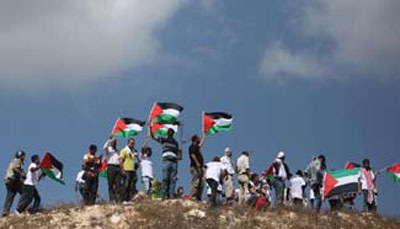 United Nations:
United Nations: President Mahmoud Abbas of the observer State of Palestine said Friday that there would be no further negotiations with Israel until there was an internationally-backed timetable for an end to occupation.
"It is impossible, and I repeat -- it is impossible -- to return to the cycle of negotiations that failed to deal with the substance of the matter and the fundamental question," he told the annual General Debate of UN General Assembly. "There is neither credibility nor seriousness in negotiations in which Israel predetermines the results via its settlement activities and the occupation's brutality."
"There is no meaning or value in negotiations for which the agreed objective is not ending the Israeli occupation and achieving the independence of the State of Palestine with East Jerusalem as its capital on the entire Palestinian Territory occupied in the 1967 war," Abbas said. "There is no value in negotiations which are not linked to a firm timetable for the implementation of this goal."
"The time has come to end this settlement occupation," he said.
The hopes for that timetable are pinned to a still-being written draft Security Council resolution calling for an end to an occupation stemming from the 1967 Arab-Israeli war in two or three years.
Citing the "genocidal scale" of Palestinian casualties in the latest Israeli-Palestinian war, the 50-day conflict ending in late August, Abbas said, "We must also assume that no one will wonder anymore why extremism is rising and why the culture of peace is losing ground and why the efforts to achieve it are collapsing."
Extremism has also been denounced regularly in the General Assembly since the "debate" -- really a marathon of 196 speeches over five and a half days -- started Wednesday. The general debate will end next Tuesday, with Sunday off.
Malaysian Prime Minister Mohd Abdul Razak was one of the many denouncing extremism.
After thanking "those who came to Malaysia's aid in this difficult year" in which Malaysia Airlines Flight MH370 disappeared en route to Beijing from Kuala Lumpur and MH17 apparently shot down over Ukraine, Razak recalled his call last year "for a global movement of the moderates, to counter extremism, " specifically "of the conflict between Sunni and Shia that is tearing the Muslim world apart."
"Two forces -- violent extremism and religious intolerance -- have joined hands beneath a black flag," Razak said, adding that now the victims in Iraq and Syria are "Sunni and Shia, Yazidi and Kurd; any who will not bow before the sword."
The extremists "have destabilized fragile nations, and threatened regional security," Razak said. "They challenge the very notion of the state. They call our youth with the siren song of illegitimate jihad and they demand all Muslims swear allegiance to their so-called caliph."
"That demand will never be met," he said. "We reject this so- called Islamic State. We reject this state defined by extremism. And we condemn the violence being committed in the name of Islam."
Guyanan President Donald Rabindranauth Ramotar called for an end to the "apartheid-like" situation in Palestine, where poverty and degradation were weapons used to repress its people.
He condemned the "barbaric and grotesque" killings of journalists, humanitarian aid workers and other hostages, and the loss of lives of civilians by the murderous extremists in Iraq and Syria.
Namibian President Hifikepunye Phamba also voiced concerns about multiple crises confronting the international community, including terrorist groups disrupting peace and stability in different parts of the world, the abduction of 200 girls in Nigeria; the "political instability" and armed conflict in South Sudan, Mali, and the Central African Republic.
However, he said the challenges were not insurmountable. The enduring values and principles of the United Nations Charter should guide the international community, as should the theme of this 69th session of the GA, "Delivering on and Implementing a Transformative Post-2015 Development Agenda."
The theme was chosen because the eight Millennium Development Goals (MDGs) were to be attained by next year.
In Namibia, Phamba said, the percentage of people living in extreme poverty had been more than halved, one of the prime MDG goals.
President Borut Pahor of Slovenia took a critical look at the United Nations itself and said the its existing structure -- especially the Security Council -- was failing its fundamental purpose, warning that if the organization is not reformed it risked being side-lined.
More and more often, deadlock in the Security Council was used as an excuse for resolving conflicts with force and without a UN mandate, he said. Those deficiencies had to be remedied immediately, thoroughly and by consensus, or it might be too late.
"The third, and probably the last world war, could in many respects be the result of an obsolete and ineffective United Nations," Pahor said.
Joining the many nations long beating the drum for UN reform, he said international security architecture must be reconsidered in order to improve capacity to prevent and resolve conflicts, and reclaim the shared values and principles enshrined in the UN Charter.
 United Nations: President Mahmoud Abbas of the observer State of Palestine said Friday that there would be no further negotiations with Israel until there was an internationally-backed timetable for an end to occupation.
United Nations: President Mahmoud Abbas of the observer State of Palestine said Friday that there would be no further negotiations with Israel until there was an internationally-backed timetable for an end to occupation.